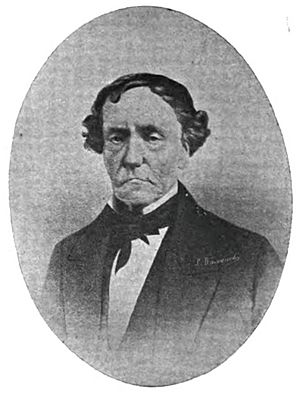José Francisco Barrundia facts for kids
José Francisco Barrundia y Cepeda (born May 12, 1787, in Guatemala City – died August 4, 1854, in New York City) was a leading Central American politician. He believed in liberal ideas, which meant he supported freedom and progress. From June 26, 1829, to September 16, 1830, he served as the temporary president of the United Provinces of Central America. This was a country that existed in Central America for a short time.
Early Life and Education
José Barrundia was born in Guatemala. He went to school at the Colegio Tridentino. There, he earned a degree in philosophy on March 19, 1803. His brother, Juan Barrundia, was also an important leader in Guatemala in 1829.
José Barrundia was known for being very smart. He could speak several languages. He even translated an important set of laws, called the Livingston Code, from English into Spanish. This code was a penal code, which means it dealt with laws about crimes and punishments. He wanted to use these laws in his own country.
Political Journey and Presidency
In 1825, Barrundia was chosen to be the first vice president of the United Provinces of Central America. This was under President Manuel José Arce. However, Barrundia decided not to take this job. Instead, he became a senator.
As a senator, he often spoke out against President Arce. He felt that Arce was becoming too conservative and not supporting enough freedom. In 1826, President Arce closed down the Congress, which was against the rules. This action led to a civil war in the region.
Barrundia strongly supported another liberal leader named Francisco Morazán from Honduras. When President Arce's government fell, Morazán became very powerful. Barrundia then became the temporary president of the United Provinces in July 1829. His main job was to organize new elections. After the elections in July 1830, Morazán took over as the official president in September.
After His Presidency
From 1831 to 1835, Barrundia worked as the secretary of education for the government of Guatemala. This was during the time when Dr. Mariano Gálvez was in charge. It was also during this period that he finished translating the Livingston Code.
Later, Barrundia disagreed with Gálvez. In 1838, he helped to remove Gálvez from power. This led to a conservative leader named Rafael Carrera becoming powerful. In 1839, Barrundia suggested that Guatemala should leave the Central American Federation. The Congress agreed to this idea.
In 1848, he started a newspaper called Album Republicano.
Barrundia was a strong supporter of human rights. In 1850, he spoke out against Carrera's government. He felt Carrera's rule was too harsh and unfair. He also challenged the strong influence of the Church in politics. Before he died, he became a minister for Honduras. He worked in Washington, D.C. to discuss the idea of Honduras joining the United States.
Even though he was not a rich man, Barrundia often refused to take a salary for the public jobs he held. He died in New York in 1854 while working for Honduras. In 1913, the president of Guatemala, Manuel Estrada Cabrera, had Barrundia's remains brought back to Guatemala.
See also
 In Spanish: José Francisco Barrundia y Cepeda para niños
In Spanish: José Francisco Barrundia y Cepeda para niños
 | James Van Der Zee |
 | Alma Thomas |
 | Ellis Wilson |
 | Margaret Taylor-Burroughs |


